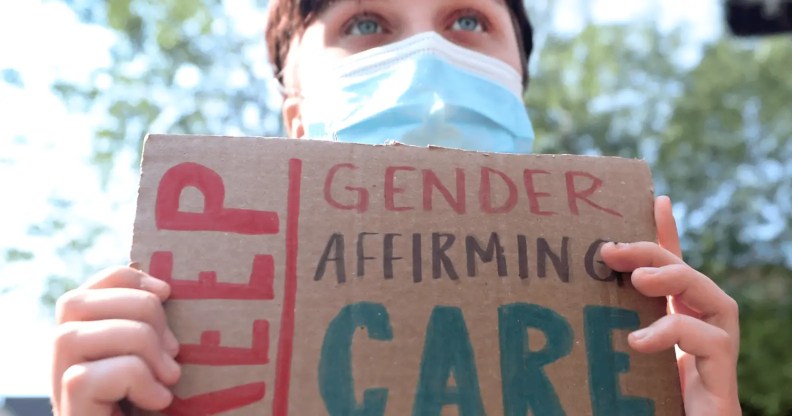At least 15 US states considering cruel Don’t Say Gay bills to stop LGBTQ+ school discussions

More states are set to add damning legislation that will affect a vast majority of LGBTQ+ people. (Getty)
More states are set to add damning legislation that will affect a vast majority of LGBTQ+ people. (Getty)
Following in the footsteps of Florida’s ‘Don’t Say Gay’ bill, more states in the US are seeking to restrict LGBTQ+ discussions in schools.
In at least 15 states, new laws aiming to stifle LGBTQ+ discussions in school are being considered. Data compiled by the American Civil Liberties Union (ACLU) also found that some places are set to go even further than Florida with restrictions.
A new bill in Oregon would stop any sort of discussion on sexual identity in schools from kindergarten to the third grade without parental consent.
An Iowa bill that recently passed through the state House would stop discussions about gender identity and sexual orientation from kindergarten to sixth grade without parents being notified.
Legislation is also being considered in Alaska that would require parents to be notified two weeks in advance about lessons that would involve “gender identity, human reproduction or sexual matters”.
Multiple bills have been introduced in Florida; one of which would require teaching students that “sex is determined by biology and reproductive function at birth”.
The original ‘Don’t Say Gay’ bill in Florida was signed into law in 2022. Florida’s governor, Ron DeSantis, accused anyone opposing it of “sloganeering”, and said they “support sexualising kids in kindergarten”, “support injecting woke gender ideology into second grade classrooms” and “support enabling schools to transition students to a different gender without the knowledge of the parent, much less without the parent’s consent”.
The bill bans LGBTQ+ topics from being discussed in classrooms, either by school staff or third parties between kindergarten and third grade. After third grade, these topics must be “age appropriate”, although the bill does not define this term.
Belief that ‘queer identities are a contagion’
According to non-profit think tank Movement Advancement Project, the Florida law has acted as a catalyst for bills across other states in the US which are currently being considered.
Gillian Branstetter, a communications strategist for the ACLU, said the new wave of anti-LGBTQ+ bills in schools would deny children equal chances to learn.
“These bills are predicated on the belief that queer identities are a contagion while straight, cisgender identities are somehow more pure or correct,” she said.
“In truth, every student has a right to have their own life stories reflected back at them and every student benefits from stories that serve as a window into the lives of people different from them.
“Censorship and homogeneity benefit no one while denying all students an equal chance to learn, grow and thrive.”
‘LGBTQ+ youth deserve better’
Following the signing of the original bill in Florida, Amit Paley, CEO of mental health and suicide prevention charity The Trevor Project, said in a statement at the time: “LGBTQ youth in Florida deserve better. They deserve to see their history, their families, and themselves reflected in the classroom.
“While I am saddened to see this harmful bill signed into law, I am inspired by the outpouring of support for LGBTQ students we have seen from parents, teachers, celebrities, and their peers.
“Social support is vital for suicide prevention, and I want to remind LGBTQ+ youth in Florida and across the country that you are not alone.”
The bill has seen fierce criticism not only from LGBTQ+ activists and the queer community, but from Joe Biden and his administration.
In a statement released in February 2022, Biden said: “I want every member of the LGBTQI+ community – especially the kids who will be impacted by this hateful bill – to know that you are loved and accepted just as you are.

